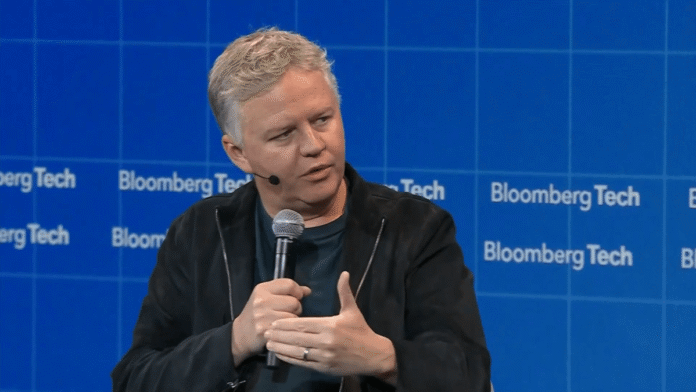Cloudflare’s Call for Fairness in the AI Landscape: A New Era of Regulation?
In a world where artificial intelligence (AI) continues to grow in importance, the conversation about its regulation has become more vital than ever. Recently, Cloudflare’s CEO, Matthew Prince, took to the stage at the Bloomberg Tech Conference in London with a message that could reshape how we think about AI and its relationship with content creators.
The Marketplace for Ideas
Earlier this year, Cloudflare introduced a marketplace specifically designed to allow websites to charge AI companies—or bots—for scraping their content. This was a significant move, signaling that it’s time to rethink the current rules of engagement in the digital world. But the conversation doesn’t end there. Prince believes that as the AI sector grows, it must be held accountable through tougher regulations, especially when it comes to giants like Google.
Google’s Dominance: A Double-Edged Sword
Prince shared that he’s speaking with the U.K.’s Competition and Markets Authority (CMA) to discuss stricter regulations designed to level the playing field for AI companies, especially those trying to compete against Google. The CMA recently recognized that Google holds a “substantial and entrenched” position in both search and advertising markets. This designation means that the CMA can impose new regulations that go beyond just search and ads—they could also tackle how Google uses AI.
What Makes Cloudflare Unique?
Interestingly, Cloudflare has a unique position in this discussion. Unlike many companies directly involved in AI, Cloudflare plays a supportive role. Prince explained, “We don’t have a dog directly in the fight. We’re not an AI company, but we’re this network that sits between them — 80% of the AI companies are our customers.” This gives them a unique perspective to advocate for fair rules.
The Googlebot Advantage
So, what’s the big deal about Google’s power? The main point Prince made is that Google uses its own web crawler—known as Googlebot—to gather content for its AI products. This practice, he argues, gives Google an unfair advantage. Other AI companies, like OpenAI or Anthropic, need to pay for content to train their AI systems, while Google can simply scrape it for free.
Imagine you’re in a race, but one runner is allowed to use shortcuts that no one else can. That’s what it feels like for many media companies and smaller creators. If they block Google’s crawler to protect their content, they face significant repercussions. Blocking the crawler also means losing 20% of their revenue from search traffic and halting their ad revenue altogether. Prince notes, “If you block Google’s crawler, it blocks their ad safety team, which means that your advertisements across all of your platforms stop working.”
Risks of a One-Sided Playing Field
The crux of the issue is that a lopsided playing field favors Google over the rest. With its combined crawling and advertising system, Google could effectively take control of the market. As Prince encapsulated, “The problem is that we then will have effectively handed the game to Google.”
This raises a larger question: How can we create a marketplace where multiple AI companies compete fairly for content from countless media and small businesses? The answer, according to Prince, may lie in regulation.
What’s Next for Regulation?
By flagging Google as a potential regulatory target, the CMA indicates they’re aware of the unique advantage Google possesses. Cloudflare has even shared data with the CMA, shedding light on how Google’s crawler operates and why replicating its success is nearly impossible for other players in the field.
This idea isn’t just coming from Cloudflare. In recent discussions, Neil Vogel, CEO of People, Inc.—the largest digital and print publisher in the U.S.—called Google a “bad actor.” He pointed out that media companies feel forced to comply with Google’s crawling practices, which could lead to them losing valuable content without appropriate compensation. Vogel states that by adopting Cloudflare’s solutions, they have managed to regain some control.
The Bigger Picture
While many may think this battle is just about who can scrape what content, it’s fundamentally about the future landscape of digital content creation and sharing. AI is rapidly reshaping our world, but it should not come at the expense of the very creators that fuel it.
It’s essential for regulators and companies alike to understand the implications of handing too much power to a single entity. The conversation about competition in AI is just beginning, and the outcomes will likely affect how we consume information for years to come.
Personal Analysis: Why This Matters
As I dive deeper into this issue, it’s clear that the implications extend far beyond the tech industry. The outcomes of these conversations around AI regulation will set the tone for how content is treated on the internet.
The lesson is simple but profound: fairness matters. If we allow one giant to dominate, we risk stifling creativity and innovation. Smaller companies and individual creators bring a wealth of diverse voices to the table, enriching our digital experience. Cloudflare’s efforts to advocate for fairness in how AI companies operate should serve as a rallying cry to protect creators in this new age.
Ultimately, navigating the future of AI regulations won’t be easy. Yet, discussions like the ones led by Prince are a step in the right direction—one toward a more balanced and equitable digital landscape. As consumers and creators, we should watch closely and ensure our voices are heard. After all, the internet should be a place where everyone can thrive, not just a select few.

